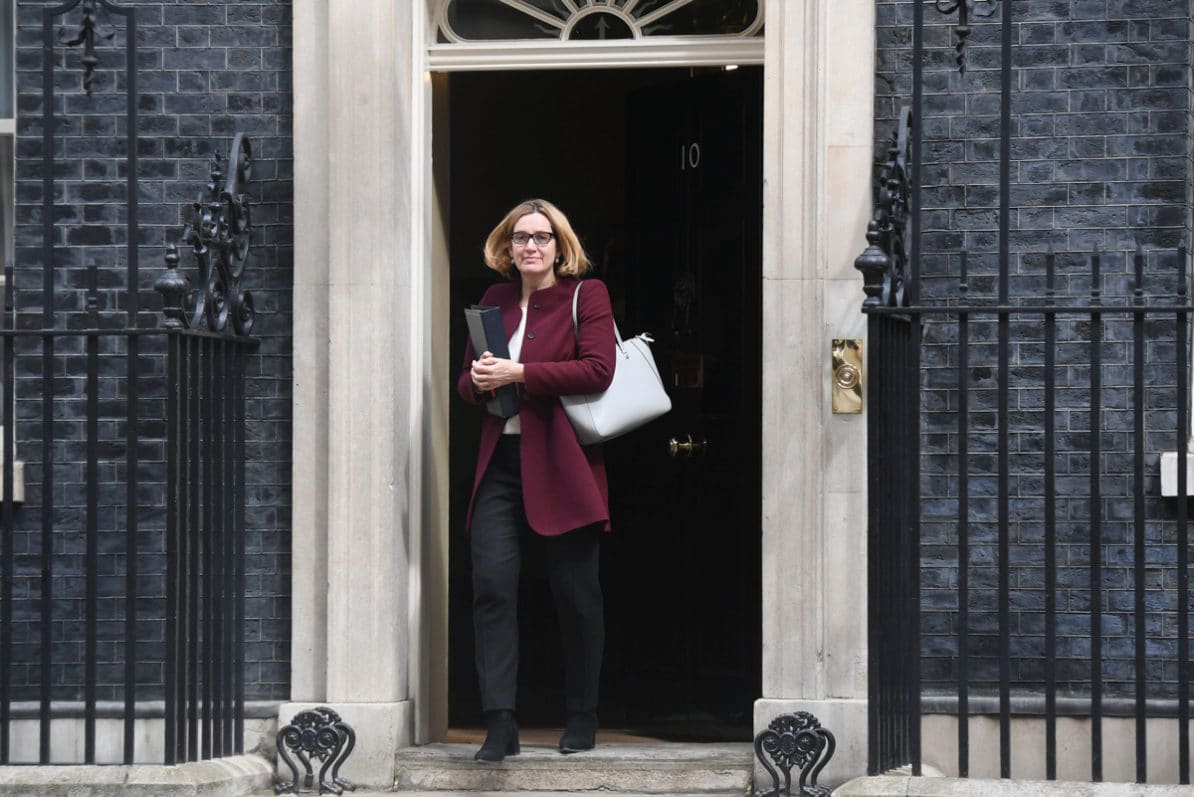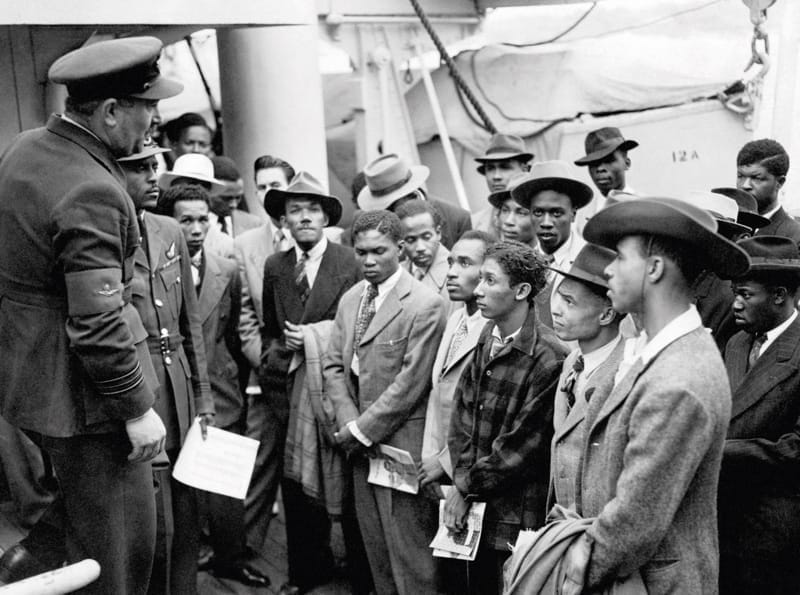Moment that mattered: Amber Rudd resigns over the Windrush scandal
In April 2018 the Home Office’s so-called ‘hostile environment’ for immigration finally cost the UK home secretary her job. In DG #31 we spoke to Satbir Singh, chief executive of the Joint Council for the Welfare of Immigrants to find out how it had come about

Home secretary Amber Rudd leaves 10 Downing Street after attending a cabinet meeting during the Windrush scandal. Photo: Victoria Jones / PA Wire / PA Images
29th April 2018 (Taken from: #31)
On 29th April, Amber Rudd stepped down as the UK’s home secretary following intense pressure over the government’s treatment of “Windrush generation” migrants – named after the passenger liner the Empire Windrush, whose voyage from the Caribbean to Tilbury in Essex in 1948 marked the start of mass migration to the UK in the post-war era. A large number of people who moved to the UK between 1948 and 1971 from Caribbean countries had been wrongly deemed illegal immigrants and had experienced repercussions including the loss of jobs, healthcare and benefits. Some reports suggest that as many as 160 people were detained or deported.
Satbir Singh, the chief executive of the Joint Council for the Welfare of Immigrants (JCWI), an independent charity which campaigns for the rights of migrants in the UK, believes that the wrongful targeting of Caribbean migrants was largely a consequence of the government’s so-called ‘hostile environment’ policy. Coming into effect in the early 2010s while Theresa May was home secretary, the policy aimed to make it as difficult as possible for illegal immigrants to remain in the UK.
Singh says that his organisation was among several groups to warn the government at the time that people who had the legal right to remain in the UK but lacked documentary evidence of their immigration status were likely to get caught up in the clampdown. But why would a government knowingly put legal residents in a precarious situation?
There’s a big difference between looking tough and having a sensible, rigorous, well-informed immigration policy”
“There’s a political imperative to look tough on immigration, and there’s a big difference between looking tough and having a sensible, rigorous, well-informed immigration policy,” Singh replies. “One involves things being well thought out with the consequences fully appraised for all sections of society and the economy, and the other involves just looking tough, making headlines and deferring the consequences into the future. I don’t know whether Theresa May thought she would be prime minister when the chickens came home to roost.”
As people born in Commonwealth countries who arrived in the UK before 1973, the Windrush migrants have the right to live and work in the country as long as they haven’t left for more than two years. Presuming their status was secure, many Windrush migrants never formalised their British citizenship or retained documentary evidence that they arrived before 1973 – and, as it transpired on 19th April 2018, thousands of landing cards detailing the migrants’ arrival in the UK had been destroyed by the Home Office in 2010.
The public first became aware of the wrongful targeting of Windrush migrants in November 2017 with the case of Paulette Wilson, who had lived in Britain for 50 years when she was told by the Home Office that she was an illegal immigrant and would be sent back to Jamaica, a country she hadn’t visited since leaving at the age of ten. She spent a week at the Yarl’s Wood detention centre in Bedfordshire and was at Heathrow waiting to board a deportation flight when she was given a reprieve. But it would be another four months before the full scale of the scandal became clear.
There is this grand idea that after Brexit the Commonwealth countries will be waiting for us to do business and will welcome us back with open arms”
“This [delay] was partly by design,” says Singh, whose organisation began to engage high commissioners for Caribbean countries in talks after the Wilson case to “work out a plan for advocacy that revolved around the Commonwealth summit” in London in April 2018.
“There is this grand idea that after Brexit the Commonwealth countries will be waiting for us to do business with them and will welcome us back with open arms,” says Singh. “What we wanted to demonstrate was this sense of unease in a lot of Caribbean countries, whose people can be mistreated when they come to live in the UK – and that these concerns needed to be heard if Britain is going to receive a red-carpet welcome after Brexit. It seemed to be a unique moment where advocacy on this issue would be possible.”
Twelve Caribbean countries requested that Theresa May speak to them at the summit about the Windrush migrants’ immigration problems, but their requests were rejected. “It was an unbelievable display of arrogance by the government,” says Singh. “That was the spark that caused the scandal to ignite.”
The Home Office was thrown into deep crisis when The Guardian published a series of articles by its reporter Amelia Gentleman in the run-up to the summit about the struggles of Windrush-generation migrants, many of whom came to the UK as children.

Jamaican immigrants are welcomed by officials after disembarking HMT Empire Windrush, 22nd June 1948. Photo: PA / PA Wire / PA Images
The migrants spoke of deportation, detention, the denial of healthcare, losing the right to work and withdrawn benefits. These in turn led to homelessness, illness, depression and bankruptcy. Some people were stuck outside the country having been refused re-entry to the UK after travelling abroad. Rudd apologised for the “appalling” actions of her department towards Windrush migrants and formed a task force to resolve the problems. Two weeks later she resigned after leaked documents contradicted her claim that she had been unaware of deportation targets.
“The government set up a task force but on day one we called it and found the people on the phones didn’t know what they were doing,” recalls Singh. “They didn’t know about Windrush, they didn’t know which countries were in the Commonwealth. All they were able to do was take people’s details – but people didn’t want to give them because they feared [immigration] enforcement turning up at their door. Then we discovered that the ‘task force’ was mostly just a series of desks in a call centre. They weren’t even immigration officials.”
People are losing their homes. People haven’t been able to work or get access to public funds for years and they’re destitute”
Meanwhile, the JCWI’s own helpline, which offers free and confidential legal advice, was receiving around 50 calls a day. “It was an unusually high volume,” says Singh. “[During the scandal] we met and worked with people who’d experienced all different parts of that spectrum of injustice. An administrative injustice, such as losing your right to work, can really be deeply humiliating and disempowering. For a lot of people it was a wake-up call. I’ve had people tell me that when they were younger their parents said, ‘Don’t ever trust them, they’ll never accept you,’ and they thought, ‘Oh, my parents must be crazy. I’m British, this is my country.’ And now these people are in their fifties, sixties and seventies and they’re saying, ‘Gosh, my parents were right.’ That’s heartbreaking. They see themselves as fully British – and they are fully British – and now they’re being told they’re something else.”
In August it was revealed that some Windrush migrants who had been wrongly targeted had received compensation from the government, but only after they signed non-disclosure agreements. “A government that is unafraid of accountability doesn’t do that,” says Singh, who points to the government’s blocking of the publication of all correspondence between ministers relating to the Windrush cases as further evidence of a government fear of transparency. Singh is pleased that those wrongly targeted will receive compensation, but worries that it’s happening too slowly. “People are losing their homes,” he says. “People haven’t been able to work or get access to public funds for years and they’re destitute.”
Although the last few months have been a draining and often disheartening experience, Singh sees a silver lining in the public reaction to the scandal. “It affirms something we have always believed, which is that people are fundamentally decent,” he says. “This idea of ‘controlling immigration’ is alluring because who wouldn’t be in favour of something being controlled? But when people see what that means in practice they find it abhorrent. A cabinet minister resigned amid a scandal about the treatment of migrants and people of colour. I don’t think that’s ever happened before – and that gives me a lot of hope.”
Amelia Gentleman, the Guardian reporter who won the prestigious Paul Foot award for her work exposing the scandal, will be speaking about Windrush at our Slow Journalism Night in London on 9th May. Tickets, which include a copy of the new issue and a drink, are available here.
Slow Journalism in your inbox, plus infographics, offers and more: sign up for the free DG newsletter. Sign me up
Thanks for signing up.








